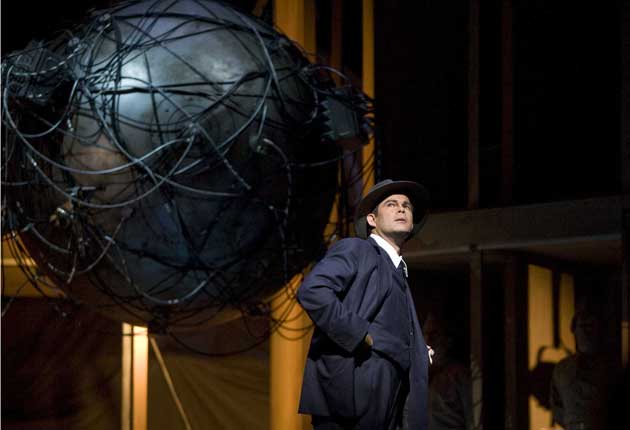The Independent's journalism is supported by our readers. When you purchase through links on our site, we may earn commission.
Adams Doctor Atomic, English National Opera, London Coliseum

At the end of the first act of John Adams’ Doctor Atomic, J. Robert Oppenheimer – harbinger of mass destruction – is suddenly confronted by the enormity of what he has created.
Invoking the words of John Donne – his Holy Sonnet “Batter my heart, three-person’d God” – he hurls out his challenge to the Almighty amidst a rush of shrill, pulsating, fanfares. At this moment he is the loneliest man in the universe and in high baroque style John Adams lays bare his agony. This aria, heart-rendingly sung by Gerald Finley, is the detonation in Oppenheimer’s soul which triggers the big bang. You can already find it on You Tube and it might just be the single most beautiful thing Adams has ever written.
There is more, much more, where that came from in Doctor Atomic, now receiving its eagerly awaited UK premiere at the London Coliseum. But there are longueurs, too. Length is an issue. There’s a whole lot of information in the opera – it’s its own information highway, the libretto being almost entirely drawn from documentary sources. But then again, has scientific data ever sounded sexier? One of Adams’ theatrical tricks here – and as a composer with such an innate understanding of theatre he always has one or two up his sleeve – is his way of setting the mundane or impossibly complex to music of great beauty and simplicity. A chorus describing the process of nuclear fission assumes the tranquillity of a Bach chorale; a description of the effects of radium on the human body is so lyrical as to be almost sensuous.
There are two distinct kinds of music in Doctor Atomic: the busy, impatient, dryly kinetic music of scientific theory (and Adams harnesses his orchestra like a force of nature) and that which foreshadows and confronts the emotional consequences of the scientists’ actions. Oppenheimer found his refuge in poetry and in the intimate second scene of the opera with Kitty, his wife (Sasha Cooke, bravely negotiating the challenging vocal compass of the role) the heady poetry of Charles Baudelaire demands and gets an effusion of lyricism.
The look of Penny Woolcock’s excellent staging, designed by Julian Crouch, beautifully complements the musico-dramatic thrust of Adams’ work. With the sculptural look of an art installation (which was its inspiration) fragments of debris hang suspended, as if mid-explosion, while tented sheets rise up to invoke the desert mountain ranges of New Mexico. Tiered boxes house the Los Alamos project personnel as if they themselves are the objects of experimentation – human guinea pigs. Videos of scientific formulae (Fifty-Nine Productions) play on every surface; at one point, a map of Hiroshima eerily burns.
Woolcock, who did such a brilliant job with the TV movie of Adams’ The Death of Klinghoffer, is especially good at building the composer’s signature choral tableaux. Nearing the climax of the opera – the testing of that first bomb – the entire ensemble moves downstage to confront us confronting them in Adams’ mightiest chorus “At the sight of this your shape stupendous” – words which could hardly be more pungently expressed in music.
No praise can be too high for the chorus work, still more that of the orchestra which, under Lawrence Renes, is forever powering towards, in Oppenheimer’s words “a brilliant luminescence”, trumpet-topped and grimly magnificent. As to individuals, Finley’s chain-smoking Oppenheimer is a model of edgy practicality, Brindley Sherratt towers as Edward Teller, and Thomas Glenn as wiry Robert Wilson is the unsettling voice of doubt.
The second act of dreams, premonitions, and predictions can only end one way and Adams’ real-time approach to “the shot” is an unbearably intense crescendo. How fitting then that the music of the final words – “Can I have some water?” in Japanese – is the saddest of the evening.
Edward Seckerson's Dr Atomic podcast for Independent Classical
Join our commenting forum
Join thought-provoking conversations, follow other Independent readers and see their replies
Comments